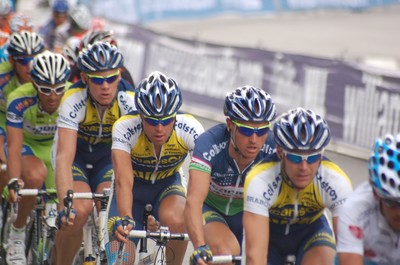Take a leap of faith into the unknown
Category: Cycling
 Money is important in every sport. Few sportsmen are vouchsafed to actually keep on with their sport full time. Athletes who race cross-country equestrianism, for example, almost always have another work too. They can't possibly live on their sport. As a professionel cyclist the money is important too, for there is no time for a full time job. However, there are cyclists who do some work or studying. When the career is over, it can feel good to know that the future is fixed, that there are colleagues who are waiting, or that you have an education that can give you work.
Money is important in every sport. Few sportsmen are vouchsafed to actually keep on with their sport full time. Athletes who race cross-country equestrianism, for example, almost always have another work too. They can't possibly live on their sport. As a professionel cyclist the money is important too, for there is no time for a full time job. However, there are cyclists who do some work or studying. When the career is over, it can feel good to know that the future is fixed, that there are colleagues who are waiting, or that you have an education that can give you work.The teams couldn't live without the sponsors, because without them they wouldn't be able to hire cyclists and give them a salary every month, they wouldn't have enough money to travel around to all races and so on. And the cyclists would themselves have to buy equipments (and where would those money come from?).
Many teams have money problems. They haven't found enugh sponsors, and is on the brink of survival. Imagine that a cyclist within this team would dope and a sponsor of the team therefore leaves. This team would have problems directly. Maybe they wouldn't be able to pay for their riders or employees.
 Team Quick Step is one of the teams with money problems. The team will have less riders than in 2009, and they won't race as many races either. In May, for example, the Giro, the Tour of Belgium and the Tour of California are all running almost simultaneously. so the team have to skip one of those races. I think they will skip Tour of California, as that's the least important race.
Team Quick Step is one of the teams with money problems. The team will have less riders than in 2009, and they won't race as many races either. In May, for example, the Giro, the Tour of Belgium and the Tour of California are all running almost simultaneously. so the team have to skip one of those races. I think they will skip Tour of California, as that's the least important race.It is a shame for the teams, and surely for the sport, that they have too little money and that sponsors are not interested in being part of the sport. Should we blame doping? Well, the sponsors are afraid of seeing its name in a bad situation, at the same time; I'm rather involved in a sport that works against doping than a sport, working to minimize the number of doping controls. Doping exists in all sports. Few doping tests are carried out in football; therefore no football player is suspended for doping offenses, even though several of them should be.
During financial crisis, it is difficult to tell a company whose shares have shown negative numbers in the newspaper stock quotes to begin sponsor a cycling team. But there are still companies that are doing well. To be a sponsor gives good publicity, but it is true, it requires a lot of money. Major cycling team needs between 6 and 14 million U.S. dollars each year.

